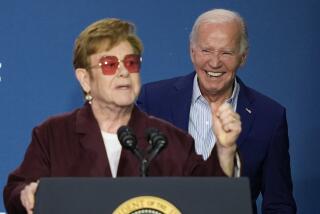The Morty Manford that Obama missed
- Share via
Sometimes the present makes an unexpected flip into the past. This past weekend, President Obama’s speech to the Human Rights Campaign, the nation’s most financially well-off gay-rights group, was chock-full of all-too-familiar unkept promises. But just as I was beginning to doze off from the familiar drone of “intentions” to repeal “don’t ask, don’t tell” and the Defense of Marriage Act (an endorsement of same-sex marriage itself being still a bridge too far), one thing bolted me wide awake. He mentioned a dear departed friend of mine, Morty Manford.
“Soon after the protests at Stonewall 40 years ago,” the president began, “the phone rang in the home of a soft-spoken elementary school teacher named Jeanne Manford. It was 1 in the morning, and it was the police. Now, her son, Morty, had been at the Stonewall the night of the raids. Ever since, he had felt within him a new sense of purpose. So when the officer told Jeanne that her son had been arrested, which was happening often to gay protesters, she was not entirely caught off-guard. And then the officer added one more thing, ‘And you know, he’s homosexual.’ Well, that police officer sure was surprised when Jeanne responded, ‘Yes, I know. Why are you bothering him?’ ”
No wonder she went on to found Parents, Families & Friends of Lesbians and Gays. The president wanted a powerful story, and his speechwriter found it. But it was one step removed from a better one: Morty’s.
Barack Obama was 8 years old when Morty Manford found himself among those fighting back against the police at the Stonewall Inn, a far-from-chic speak-easy in Greenwich Village. In those days, it was illegal for “acknowledged” or “obvious” gays and lesbians to congregate in public. Consequently, gay nightspots were run by the Mafia (the Gambino crime family was especially prominent in this practice), which would pay off the authorities to keep the clubs from being closed down. When payments didn’t arrive on time or fell short of the promised fee, such places were raided and their customers arrested. But on June 27, 1969, the customers fought back, and the “riot” that ensued went on for several days. Out of it grew new gay-rights organizations, the most important being the Gay Activists Alliance, which Morty co-founded.
From the late 1960s through the mid-1970s, I worked on the GAA’s media committee with Morty’s lover, budding film scholar Vito Russo. It was our job to make sure the local newspapers and pre-cable television covered our protest demonstrations, which we called zaps. Getting coverage was no easy task in an era when the New York Times, under Abe Rosenthal, avoided homosexual issues like the plague.
Morty proved to be well-suited to fighting. In 1968, he had helped found Gay People at Columbia University, one of the nation’s first gay campus groups. In 1972, he took on Michael Maye, president of New York City’s Uniformed Firefighters Assn., who was accused of beating Morty during a GAA zap of the Inner Circle -- New York City big shots who got together for homophobic skits and partying. Several city officials testified that Maye threw Morty down an escalator, then kicked and stomped him. Maye was acquitted, but the gay-rights law the GAA wanted the muckety-mucks to pass was signed soon afterward.
Neither flamboyantly gay nor “straight-acting / straight-appearing,” Morty was a quietly compelling figure. I don’t recall him ever raising his voice. But he always insisted on fighting back. This is something gays and lesbians barely thought possible then. Morty helped change that, and on Sunday -- nearly four decades later -- we saw tens of thousands of marchers in Washington demanding that the president’s words about gay rights become actions.
In 1992, Morty died at 41 from complications from AIDS. By then, he was a New York state assistant attorney general. But if he’d lived, I know he wouldn’t have been sitting in the audience applauding Obama at the Human Rights Campaign dinner. He would have gotten right in the president’s face, insisting on full equality for the LGBT community.
It’s very doubtful a cheery anecdote could be fashioned out of that.
More to Read
Sign up for Essential California
The most important California stories and recommendations in your inbox every morning.
You may occasionally receive promotional content from the Los Angeles Times.












